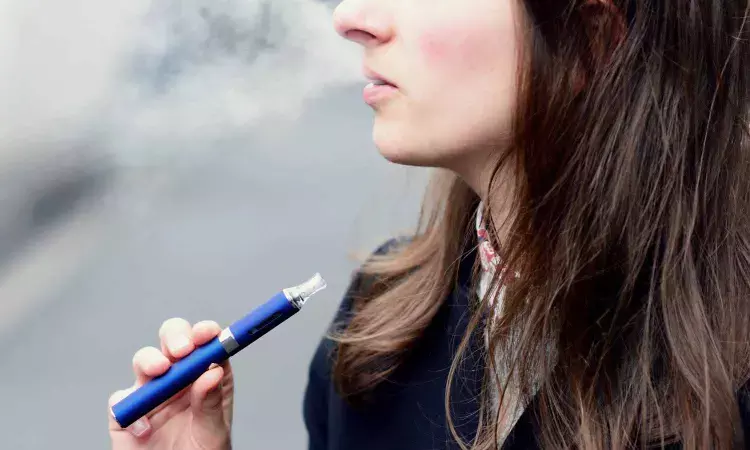- Home
- Medical news & Guidelines
- Anesthesiology
- Cardiology and CTVS
- Critical Care
- Dentistry
- Dermatology
- Diabetes and Endocrinology
- ENT
- Gastroenterology
- Medicine
- Nephrology
- Neurology
- Obstretics-Gynaecology
- Oncology
- Ophthalmology
- Orthopaedics
- Pediatrics-Neonatology
- Psychiatry
- Pulmonology
- Radiology
- Surgery
- Urology
- Laboratory Medicine
- Diet
- Nursing
- Paramedical
- Physiotherapy
- Health news
- Fact Check
- Bone Health Fact Check
- Brain Health Fact Check
- Cancer Related Fact Check
- Child Care Fact Check
- Dental and oral health fact check
- Diabetes and metabolic health fact check
- Diet and Nutrition Fact Check
- Eye and ENT Care Fact Check
- Fitness fact check
- Gut health fact check
- Heart health fact check
- Kidney health fact check
- Medical education fact check
- Men's health fact check
- Respiratory fact check
- Skin and hair care fact check
- Vaccine and Immunization fact check
- Women's health fact check
- AYUSH
- State News
- Andaman and Nicobar Islands
- Andhra Pradesh
- Arunachal Pradesh
- Assam
- Bihar
- Chandigarh
- Chattisgarh
- Dadra and Nagar Haveli
- Daman and Diu
- Delhi
- Goa
- Gujarat
- Haryana
- Himachal Pradesh
- Jammu & Kashmir
- Jharkhand
- Karnataka
- Kerala
- Ladakh
- Lakshadweep
- Madhya Pradesh
- Maharashtra
- Manipur
- Meghalaya
- Mizoram
- Nagaland
- Odisha
- Puducherry
- Punjab
- Rajasthan
- Sikkim
- Tamil Nadu
- Telangana
- Tripura
- Uttar Pradesh
- Uttrakhand
- West Bengal
- Medical Education
- Industry
Smoking cessation drug varenicline helps young adults quit vaping: Study

A new study by investigators from Mass General Brigham showed that teens and young adults who took varenicline-an FDA-approved, twice-daily smoking cessation pill for adults-are more than three times as likely to successfully quit vaping compared to those who received only behavioral counseling. Results are published in JAMA.
“Vaping is extremely popular among kids, and we know that this early nicotine exposure can make drugs like cocaine more addictive down the line, yet ours is the first treatment study to look at this vulnerable population,” said lead author A. Eden Evins, MD, MPH, director of the Center for Addiction Medicine at Massachusetts General Hospital (MGH), a founding member of the Mass General Brigham healthcare system. “We wanted to help teens and young adults quit, and we found that prescribing varenicline is the best way to do that.”
About a quarter of 18-to-25-year-olds vaped in 2023, and roughly 8% of high schoolers vaped in 2024. Vapes have become a popular alternative to cigarettes with the added challenge of being easy to conceal and easy to use in public places. Yet they contain many of the same familiar health threats, like nicotine addiction, carcinogen and heavy metal exposure, and pulmonary inflammation. Exploring treatment plans is crucial to provide teens and young adults with safe, effective avenues to quit.
To identify such a treatment avenue, the Mass General Brigham team recruited 261 participants aged 16-to-25 into a randomized clinical trial. Participants were sorted into three treatment groups. The first was varenicline, weekly behavioral counseling, and access to a free text support service called “This is Quitting.” The second was placebo pills, weekly behavioral counseling, and the text service. The third was the text service alone. Each group was treated for 12 weeks, then checked on monthly for another 12 weeks post-treatment.
Each week, participants reported whether they had successfully quit vaping, and their responses were verified with cotinine saliva tests. At the end of 12 weeks of treatment and at three-month follow-up, the varenicline group had the highest quitting success rate. At 12 weeks, 51% of varenicline users had stopped vaping, compared to 14% of placebo users and 6% of text-only users. At 24 weeks, 28% of varenicline users had stopped vaping, compared to 7% of placebo users and 4% of text-only users.
These findings demonstrate the importance of medication to help young people who are addicted to nicotine quit vaping, since the varenicline group had three times more success quitting vaping than their placebo counterparts-despite both engaging in behavioral therapy. Further research is needed to explore the potential impact of other therapeutic approaches, as well as to look at even younger people who use nicotine vapes.
Because varenicline is already approved for smoking cessation in adults, it can be prescribed for anyone aged 16 to 25 wanting to quit nicotine vaping.
“Not only was varenicline effective in this age group-it was safe. Crucially, we didn’t see any participants that quit vaping turn to cigarettes,” said Randi Schuster, PhD, founding director of the Center for School Behavioral Health at MGH. “Our findings illustrate the effectiveness and safety of this therapy to address the urgent public health concern of adolescents addicted to nicotine because of vapes.”
Reference:
Evins AE, Cather C, Reeder HT, et al. Varenicline for Youth Nicotine Vaping Cessation: A Randomized Clinical Trial. JAMA. Published online April 23, 2025. doi:10.1001/jama.2025.3810.
Dr Kamal Kant Kohli-MBBS, DTCD- a chest specialist with more than 30 years of practice and a flair for writing clinical articles, Dr Kamal Kant Kohli joined Medical Dialogues as a Chief Editor of Medical News. Besides writing articles, as an editor, he proofreads and verifies all the medical content published on Medical Dialogues including those coming from journals, studies,medical conferences,guidelines etc. Email: drkohli@medicaldialogues.in. Contact no. 011-43720751


